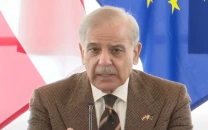Public universities in Punjab to go solar by December
Minister says 345 govt schools will also use alternate sources of energy

REPRESENTATIONAL IMAGE. PHOTO: REUTERS
The minister said that 345 government schools in Dera Ghazi Khan division would completely be shifted to solar power by November 2019.
All big public sector universities will be shifted to solar energy by the end of the current year, while offices and hospitals would soon follow suit. “Everywhere in the world, countries are shifting their energy needs to alternative energy sources and Pakistan should not be left behind.”
Dr Malik ordered energy department officials to actively play their role in pulling Pakistan out of the energy crisis. He told meeting participants to increase the capacity of the department and said fresh staff would be recruited for vacant posts; and that too on merit.
Punjab additional chief secretary, energy secretary and representative of attached organisations attended the meeting. Punjab Energy Secretary Amir Jan briefed the minister about departmental issues.
Progress on all ongoing development projects was reviewed in the meeting. Several issues related to the federal government also came up for discussion. The minister said all the issues related to the federal government would be resolved with consultation and mutual agreement.
According to Alternate Energy Development Board (AEDB), solar power can play a vital role in overcoming the energy shortages in Pakistan. He added there is vast potential to tap into the resource to provide electricity to the national grid and those areas which are off the grid.
The government of Pakistan is already offering excellent incentives to investors for solar power development in the country. Investors have been offered lucrative fiscal and financial incentives that are of key interest for them to come to this market. The provincial governments, particularly the Punjab government, are also facilitating development of solar power in Pakistan.
Though the country started late to develop solar PV power projects, it has now reached the stage on which big projects are coming up. At present, 28 projects of 956.8 MW capacity are under development within the framework of AEDB policies and procedures. These projects are at various stages of development.
The board highlights that it had undertaken several measures to create an enabling environment for the development of solar power in Pakistan. These include amendments to the grid code for solar power projects with the support of CPPA/NTDC.
Published in The Express Tribune, May 30th, 2019.


















COMMENTS
Comments are moderated and generally will be posted if they are on-topic and not abusive.
For more information, please see our Comments FAQ